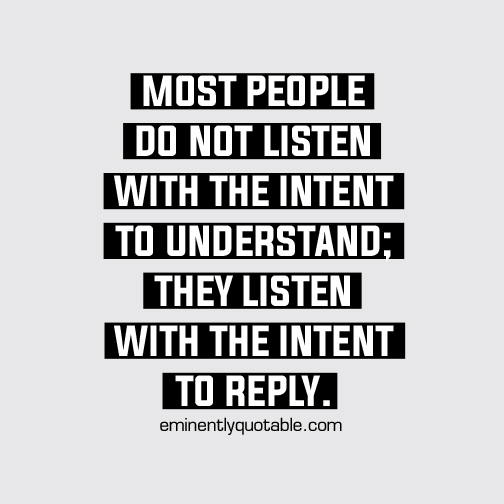
graphic © eminentlyquotable.com
“Most people do not listen with the intent to understand; they listen with the intent to reply.”
Parents are so keen on hearing their small tots speak for the first time. In fact, kids who learned to speak early on their lives are perceived as more cognitively advanced than their babbling peers. Interestingly, the act of listening is not given much credit despite the effort to hold one’s tongue and let the other person finish, regardless of whether or not they’re making sense.
Good listening is rarely thought in school or at home, and that is why active listeners belong to the growing list of endangered species. Bernard Ferrari, author of “Power Listening: Mastering the Most Critical Business Skill of All” says that good listening plays a big part in developing fresh insights and ideas that lead to success. Unfortunately, most people focus solely in learning how to communicate effectively. Although talking shows a person’s intelligence, it’s through listening attentively that one’s sincerity and character are revealed.
Ferrari writes in an article for McKinsley Quarterly the three kinds of behaviour that play major roles in the having a good ear: being respectful, talking less, and challenging assumptions. Without these three, conflict and misunderstanding may arise out of nowhere. It sounds so easy yet sometimes people are too eager to express their own thoughts that they dominate the discussion, making the other person feel disrespected.
The more you listen, the more able you are to make informed decisions. Most importantly, it also minimizes conflicts in your life as you seek to understand people better before opening your mouth.
😳 What Tinnitus Does To Your Brain Cells (And How To Stop It)
After 47 years of studies and countless brain scans done on more than 2,400 tinnitus patients, scientists at the MIT Institute found that in a shocking 96% of cases, tinnitus was actually shrinking their brain cells.
As it turns out, tinnitus and brain health are strongly linked.
Even more interesting: The reason why top army officials are not deaf after decades of hearing machine guns, bombs going off and helicopter noises…
Is because they are using something called "the wire method", a simple protocol inspired by a classified surgery on deaf people from the 1950s...
★ How To Get Rid Of Nail Fungus:
★ Does Your Salad Contain This Vegetable?
★ Top 10 Most Valuable Medicinal Herbs:





